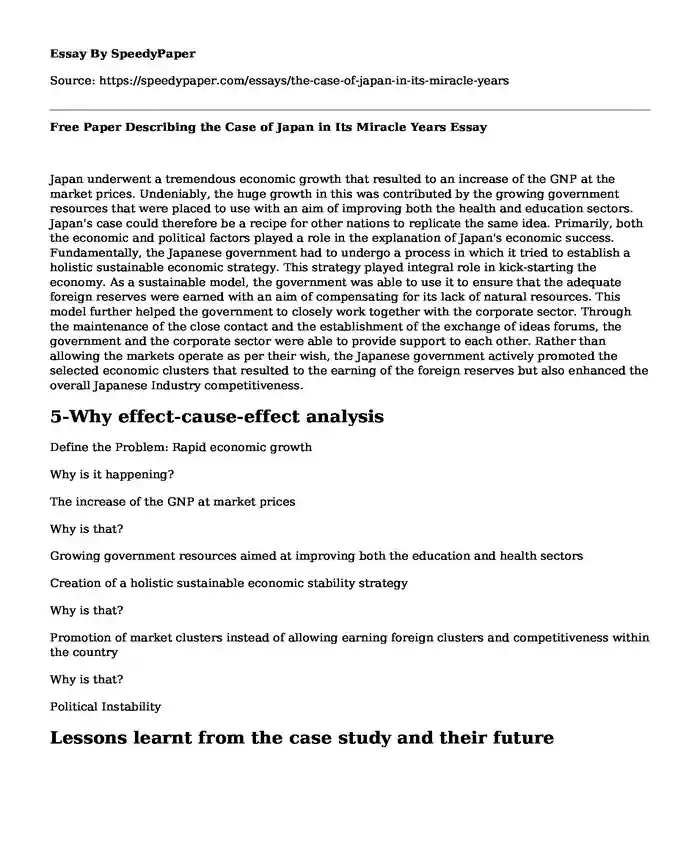Japan underwent a tremendous economic growth that resulted to an increase of the GNP at the market prices. Undeniably, the huge growth in this was contributed by the growing government resources that were placed to use with an aim of improving both the health and education sectors. Japan's case could therefore be a recipe for other nations to replicate the same idea. Primarily, both the economic and political factors played a role in the explanation of Japan's economic success. Fundamentally, the Japanese government had to undergo a process in which it tried to establish a holistic sustainable economic strategy. This strategy played integral role in kick-starting the economy. As a sustainable model, the government was able to use it to ensure that the adequate foreign reserves were earned with an aim of compensating for its lack of natural resources. This model further helped the government to closely work together with the corporate sector. Through the maintenance of the close contact and the establishment of the exchange of ideas forums, the government and the corporate sector were able to provide support to each other. Rather than allowing the markets operate as per their wish, the Japanese government actively promoted the selected economic clusters that resulted to the earning of the foreign reserves but also enhanced the overall Japanese Industry competitiveness.
5-Why effect-cause-effect analysis
Define the Problem: Rapid economic growth
Why is it happening?
The increase of the GNP at market prices
Why is that?
Growing government resources aimed at improving both the education and health sectors
Creation of a holistic sustainable economic stability strategy
Why is that?
Promotion of market clusters instead of allowing earning foreign clusters and competitiveness within the country
Why is that?
Political Instability
Lessons learnt from the case study and their future application
The primary lesson learned from the case of Japan in this case study is that even irrespective of the fact that globalization plays critical restricts the role of the government and its freedom to develop economic policies and protect its industries and employment, the government role still remains fundamental in ensuring that businesses succeed. Notably, the government made huge investments in the areas such as the education, health, social security and infrastructure. However, the governments should put more efforts in order to embrace and replicate the Japanese efforts as well as the situation if at all they also want to succeed. In this situation, the honour and prestige and honor dominates operation of the government. Undeniably, the bureaucracy constitute a real fourth power that would be better positioned to resists the propensity towards the nepotism and populist short-term legislations. Another lesson learnt from the case is that a strong bureaucracy is critical in the world whereby the world's economy spikiness offers substantial proof for the Wallenstein's World System Theory. This is based on the fact that the theory played a big role in helping Japan move from its dire post-war situation and its technocratic approach to the internal economic challenges further assisted it in returning and emerging as the most stable world economy. The developing nations must also learn vital lessons from the miracles years that Japan experienced. Through this, such emerging economies may further get the opportunity of establishing of an enlightened meritocratic bureaucracy that observes itself as the facilitator of the transformation to a tremendously economic development that is sustainable.
Cite this page
Free Paper Describing the Case of Japan in Its Miracle Years. (2022, Jul 11). Retrieved from https://speedypaper.net/essays/the-case-of-japan-in-its-miracle-years
Request Removal
If you are the original author of this essay and no longer wish to have it published on the SpeedyPaper website, please click below to request its removal:
- Free Essay Sample on Foodborne Illness
- Modernism in The Waste Land - Free Essay in Literature
- Accounting Essay Example
- Union Sees Nationwide Impact from US Gov't Furloughs - Article Review Essay Example
- Feminism Essay Example: Hiring Discrimination and Gender Pay Gap
- Essay Sample: Racism, Slavery, Bourgeois and Proletarians in Frederick Douglass's Life
- Free Essay in American Literature: Feminism and Women Oppression in The Yellow Wallpaper
Popular categories





